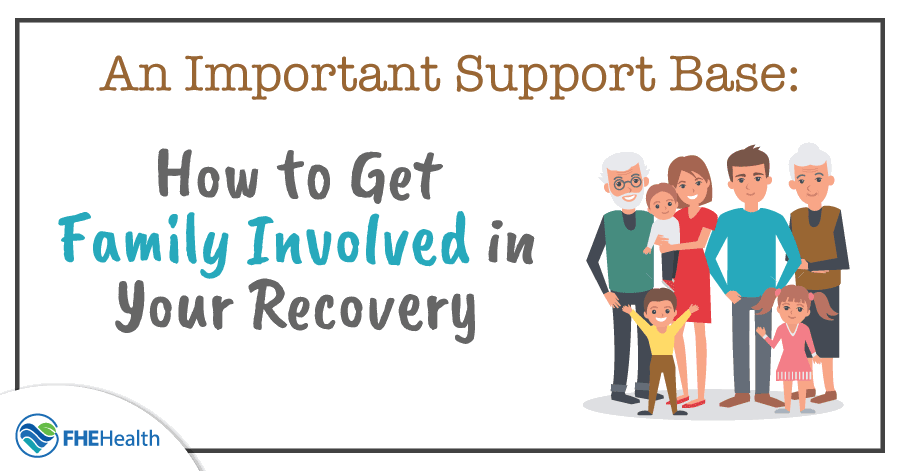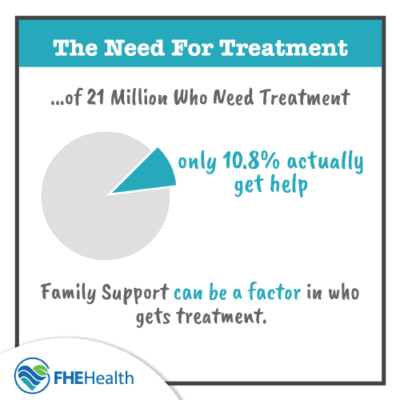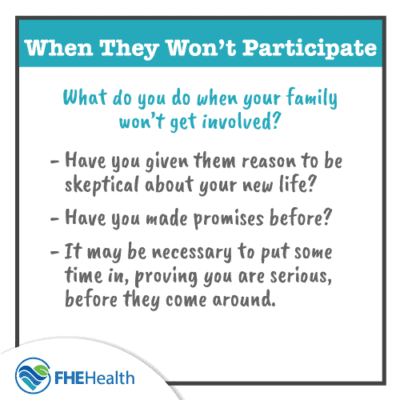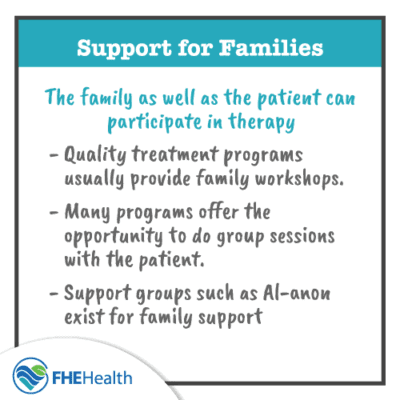
When it comes to successful recovery, having a support system of individuals committed to your long-term sobriety can make a big difference. Getting your family involved in your recovery can help you at any stage of recovery. Family members can help you focus on recovery during rehab and can offer a safe, supportive base that helps you stick to your recovery plan once your rehab program is complete. Only about 10.8 percent of the more than 21 million Americans over age 12 who need substance abuse treatment actually get help, and family support can be a factor in who gets treatment and who completes their treatment plan successfully.
Family Involvement in the Decision to Go to Rehab
 If you’re thinking about entering a rehab program for drug or alcohol abuse, getting your family comfortable with the idea makes the process easier. In some cases, family members are the ones who suggest rehab in the first place. In other cases, family members might be unwilling to admit the extent of the problem or might be doubtful whether rehab can help.
If you’re thinking about entering a rehab program for drug or alcohol abuse, getting your family comfortable with the idea makes the process easier. In some cases, family members are the ones who suggest rehab in the first place. In other cases, family members might be unwilling to admit the extent of the problem or might be doubtful whether rehab can help.
If your family has staged interventions in the past that you resisted, consider letting them know that you appreciate their efforts and understand the importance of recovery now. Knowing that their caring, concerned interventions helped you —even if both you and they didn’t realize it at the time — can make family members feel appreciated and get them on board with your current recovery efforts.
Ways Your Family Can Help You Navigate the Rehab Process
Different family members have different things to contribute to your recovery process, and not every family member may be willing to take on extra responsibilities. If you have family members who are interested in helping but don’t know what to do, here are some of the ways they might get involved in your recovery process:
- Helping navigate the paperwork involved with insurance, payment and medical treatment
- Participating in treatment planning
- Attending family counseling or getting individual counseling focused on ways to help the recovering family member
- Providing therapists and doctors with more information about their loved one’s lifestyle, activities or habits
- Encouragement and emotional support for the recovering family member
- Helping with financial needs during recovery and providing a safe, secure housing situation for the recovering individual
- Providing a judgment-free person to talk to about issues that come up during recovery
- Helping manage the organizational side of treatment sessions by reminding the recovering individual about important appointments and providing transportation
- Monitoring symptoms after rehab to identify potential relapses
- Providing alternate activities during social events that help the recovering loved one avoid drugs or alcohol
Dealing with Family Members During Recovery
 Recovery can bring up a lot of emotions for both the person in rehab and those close to them. Getting everyone in the family involved in counseling during the process can help smooth the transition into your new life of sobriety.
Recovery can bring up a lot of emotions for both the person in rehab and those close to them. Getting everyone in the family involved in counseling during the process can help smooth the transition into your new life of sobriety.
Some family members may need to see that you’re serious about recovery before they’re willing to participate in group family therapy or offer support. This is especially true if you have promised to seek help before and failed to follow through. Describing the steps you have taken so far to get help and what steps you have planned for the next few days, weeks and months may help alleviate the fears of family members and help get them on board with your recovery plan.
Reconnecting with Family After Rehab
For some, addiction and substance abuse cause serious damage to relationships with friends and family. After rehab, you might want to reconnect with those you harmed before seeking treatment. In some cases, family members may be reluctant to give you another chance or may be so harmed by your actions that reconnecting isn’t possible. Many people are willing to grant recovering addicts a chance at repairing the relationship if they believe that rehab was successful, though.
The first steps to reconnecting with loved ones after rehab are to acknowledge any harm you caused and make a sincere apology for it. Try to be welcoming of any help that family members offer, even if it isn’t as much as you hope for. Some of your loved ones may need to start with small things before reestablishing a deep connection with you. As you move forward and prove through your actions that you’re committed to sobriety, you might be able to develop those deep bonds again over time.
Balancing Family Support and Autonomy During Recovery
 As you reconnect with family members and make your way through the recovery process, you might find that some of the support your loved ones provide isn’t as helpful as it could be. Sometimes family members have their own issues to deal with that could hamper your recovery. Family members who are resentful or angry could make recovery more difficult, while overenthusiastic family members might try to micromanage your recovery to the point where you can’t develop self-sufficiency.
As you reconnect with family members and make your way through the recovery process, you might find that some of the support your loved ones provide isn’t as helpful as it could be. Sometimes family members have their own issues to deal with that could hamper your recovery. Family members who are resentful or angry could make recovery more difficult, while overenthusiastic family members might try to micromanage your recovery to the point where you can’t develop self-sufficiency.
An effective family therapist can help you and your family balance support with your independent efforts to recover. Group sessions might help your family work through any issues that arise during treatment, and individual sessions can help supportive family members work through any feelings and decisions that might arise without having to talk about those things in front of you. For many, balancing family support and autonomy involves a lot of trial and error to determine what works best for each member of the family unit.
As time goes on and your recovery progresses, your needs might change as well. Family support at the start of a recovery program often looks different than the support required after completion of a rehab program. A counselor trained in family therapy and addiction recovery can help your family adjust as your recovery progresses.
If you’re ready to take the next step toward recovery and enter rehab, our admissions counselors can help you develop a treatment program that works for you and your family. Contact FHE Health today to learn more about your options.






